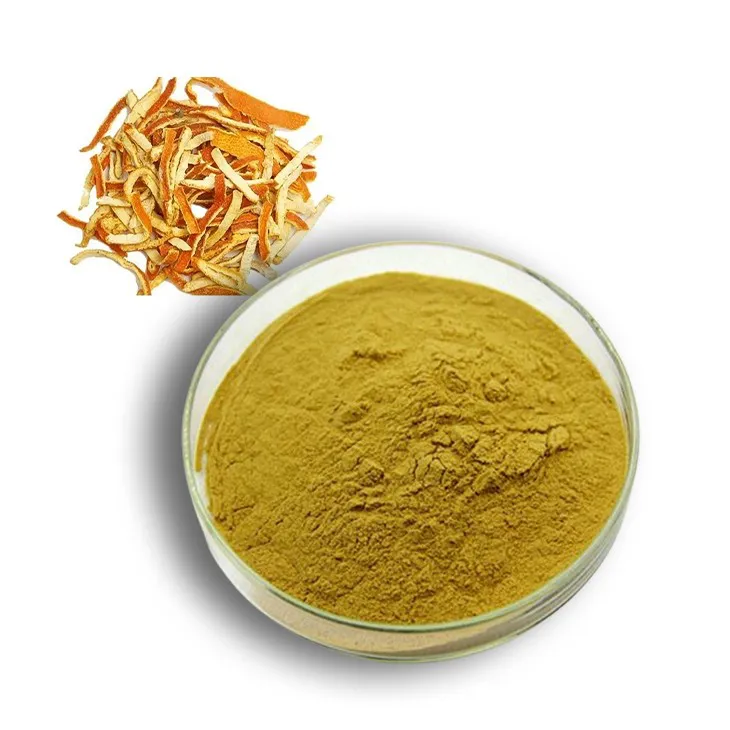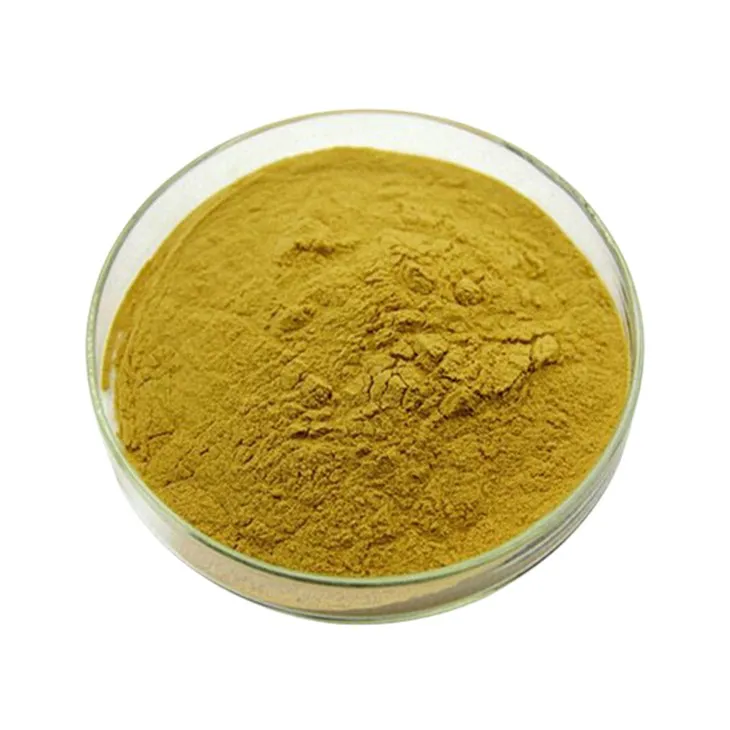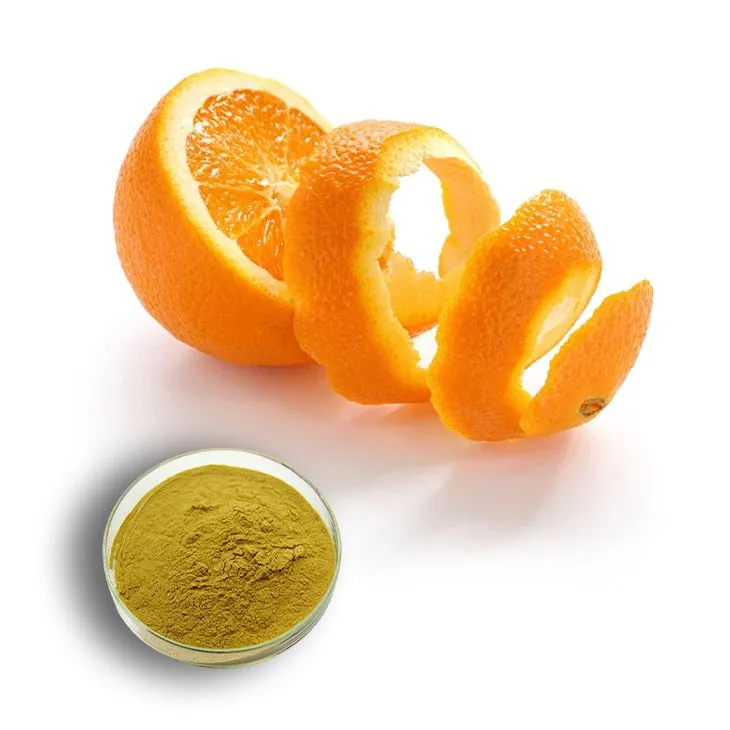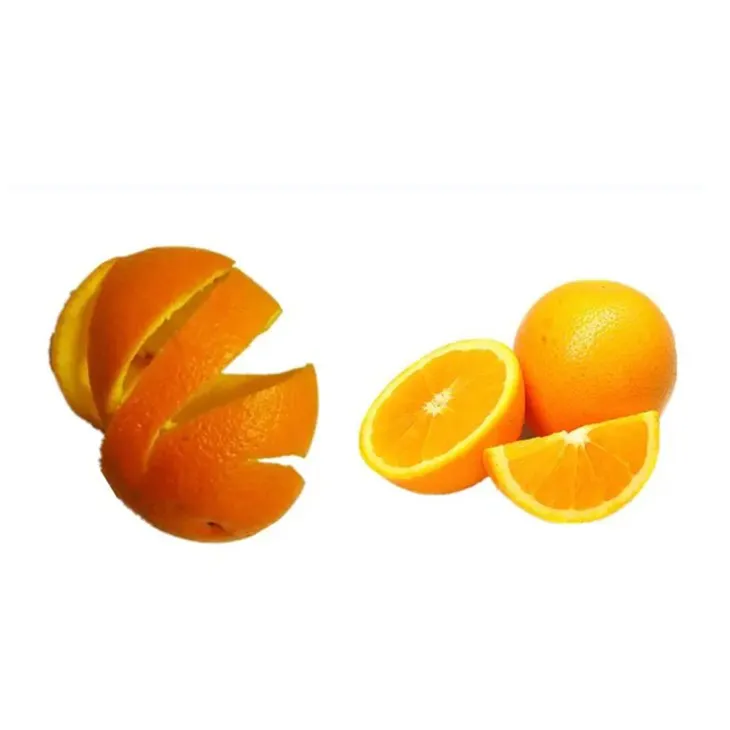- 0086-571-85302990
- sales@greenskybio.com
What is hesperidin and why is it used on the skin?
2024-11-13

1. Introduction to Hesperidin
Hesperidin is a flavanone glycoside that is abundantly found in citrus fruits, especially in their peels. It is a natural compound that has been the focus of numerous scientific studies due to its various beneficial properties. Chemically, it consists of a hesperetin molecule linked to a rutinose sugar molecule. This unique chemical structure is what endows Hesperidin with its characteristic biological activities.

2. Collagen Synthesis Promotion
Collagen is an essential component of the skin, playing a crucial role in maintaining its structure and integrity. As people age, the natural production of collagen in the body gradually decreases. This decline is one of the main factors contributing to the appearance of wrinkles, skin sagging, and a loss of elasticity.
Hesperidin has been shown to have a positive impact on collagen synthesis. It acts on the fibroblasts in the skin. Fibroblasts are cells that are responsible for producing collagen, elastin, and other extracellular matrix components. By interacting with these fibroblasts, hesperidin stimulates them to increase the production of collagen.
This effect of hesperidin on collagen synthesis is significant for skin health. When the skin has an adequate supply of collagen, it appears firmer and more taut. It can also help to reduce the appearance of fine lines and wrinkles, giving the skin a more youthful and healthy look.

3. UV - Protective Effects
Ultraviolet (UV) radiation from the sun is a major threat to skin health. There are two main types of UV radiation that reach the Earth's surface: UVA and UVB. UVA rays penetrate deep into the skin and can cause long - term damage such as premature aging, while UVB rays are mainly responsible for sunburn and can also contribute to skin cancer development.
Although hesperidin cannot substitute for sunscreen completely, it does offer some degree of protection against UV radiation. It acts as an antioxidant within the skin cells. When the skin is exposed to UV rays, free radicals are generated. These free radicals can cause damage to cellular components such as DNA, proteins, and lipids. Hesperidin can scavenge these free radicals, thereby reducing the oxidative stress induced by UV exposure.
In addition, hesperidin may also play a role in enhancing the skin's natural defense mechanisms against UV radiation. It can upregulate certain genes and proteins that are involved in the skin's UV - protection pathways. For example, it may increase the expression of enzymes that repair DNA damage caused by UV rays.

4. Moisturizing Properties
Maintaining proper skin moisture is essential for healthy - looking skin. Dry skin can be itchy, flaky, and more prone to developing wrinkles. Hesperidin has moisturizing properties that help the skin to retain water.
The mechanism by which hesperidin moisturizes the skin is related to its ability to interact with the skin's lipid barrier. The lipid barrier in the skin helps to prevent water loss from the skin. Hesperidin can enhance the integrity of this lipid barrier, making it more effective in retaining moisture.
Moreover, hesperidin may also influence the skin's water - binding capacity. It can increase the amount of water that the skin can hold, resulting in a more hydrated and supple appearance. This is particularly beneficial for individuals with dry or dehydrated skin types.

5. Anti - Inflammatory Effects
Inflammation in the skin can be caused by a variety of factors, such as exposure to environmental pollutants, allergens, or microbial infections. Chronic inflammation can lead to various skin problems, including acne, eczema, and psoriasis.
Hesperidin has been shown to possess anti - inflammatory properties. It can modulate the activity of immune cells in the skin. For example, it can regulate the production of cytokines, which are small proteins that play a key role in the immune response and inflammation.
By reducing inflammation in the skin, hesperidin can help to soothe irritated skin, reduce redness, and promote the healing of damaged skin. It can also be beneficial for individuals with sensitive skin types, as it can help to reduce the likelihood of skin reactions to external stimuli.
6. Antioxidant Activity
The skin is constantly exposed to oxidative stress, which is caused by an imbalance between the production of reactive oxygen species (ROS) and the body's antioxidant defense mechanisms. ROS can damage cells and tissues in the skin, leading to premature aging and various skin diseases.
Hesperidin is a powerful antioxidant. It can neutralize ROS such as superoxide anions, hydroxyl radicals, and hydrogen peroxide. By doing so, it helps to protect the skin from oxidative damage.
The antioxidant activity of hesperidin also contributes to its other beneficial effects on the skin. For example, by reducing oxidative stress, it can enhance the skin's ability to repair DNA damage, promote collagen synthesis, and maintain the integrity of the skin's lipid barrier.
7. Incorporating Hesperidin in Skin Care Products
Given its multiple beneficial properties for the skin, hesperidin has been increasingly incorporated into various skin care products.
1. Creams and Lotions
- Many anti - aging creams and lotions now contain hesperidin. These products are designed to target the signs of aging such as wrinkles and sagging skin. By promoting collagen synthesis and providing antioxidant protection, hesperidin - containing creams can help to improve the overall appearance of the skin.
- Moisturizing creams with hesperidin are also popular. They can help to keep the skin hydrated and supple, especially for those with dry skin.
2. Serums
- Hesperidin - based serums are often formulated to deliver a high concentration of the compound to the skin. These serums can penetrate deep into the skin layers, where they can exert their beneficial effects more effectively. For example, they can target fibroblasts in the dermis to stimulate collagen production.
- Some serums also combine hesperidin with other active ingredients such as vitamins C and E. This combination can enhance the antioxidant activity and provide comprehensive skin protection.
3. Masks
- Face masks containing hesperidin can provide a concentrated treatment for the skin. They can be used once or twice a week to give the skin an extra boost of hydration, collagen - promoting, and antioxidant benefits.
- Some masks also contain additional ingredients like clay or charcoal, which can help to draw out impurities from the skin while hesperidin works on improving the skin's health from within.
8. Safety and Precautions
Generally, hesperidin is considered safe for topical use on the skin. However, as with any new skin care ingredient, it is advisable to do a patch test before using a product containing hesperidin extensively.
Some individuals may be allergic to citrus - derived products, and since hesperidin is sourced from citrus peels, there is a potential for allergic reactions in these individuals. If any signs of redness, itching, or swelling occur after using a hesperidin - containing product, it should be discontinued immediately.
Also, while hesperidin offers certain UV - protective effects, it should not be relied upon as the sole means of sun protection. Sunscreen with an appropriate sun protection factor (SPF) should still be used when exposed to the sun for extended periods.
9. Conclusion
Hesperidin is a remarkable natural compound with a wide range of beneficial effects on the skin. Its ability to promote collagen synthesis, protect against UV radiation, moisturize the skin, reduce inflammation, and act as an antioxidant makes it a valuable ingredient in skin care products.
As research on hesperidin continues, more insights into its mechanisms of action and potential applications in skin health are likely to be discovered. However, it is important to use products containing hesperidin safely and in combination with other skin - care practices such as sun protection and a healthy lifestyle.
FAQ:
1. Can hesperidin completely reverse skin aging?
While hesperidin has beneficial effects on the skin such as promoting collagen synthesis, it cannot completely reverse skin aging. Aging is a complex process involving multiple factors like genetics, lifestyle, and environmental exposure. Hesperidin can help improve some aspects of skin aging, like increasing skin firmness by promoting collagen production, but it cannot undo all the damage that has occurred over time.
2. How does hesperidin compare to other skin - beneficial compounds?
Hesperidin has its unique properties compared to other compounds. For example, compared to some vitamins like vitamin C which is also known for its role in collagen synthesis, hesperidin also has UV - protective and moisturizing effects in addition to promoting collagen. However, different compounds may work better for different skin types or concerns. Some may be more effective for reducing inflammation, while hesperidin focuses more on the aspects mentioned earlier.
3. Is hesperidin suitable for all skin types?
Generally, hesperidin is suitable for most skin types. For dry skin, its moisturizing properties are beneficial. For aging skin, its collagen - promoting and UV - protective effects can be helpful. However, those with very sensitive skin may need to test products containing hesperidin first, as there is a small possibility of an allergic reaction, although this is rare.
4. How long does it take to see the effects of hesperidin on the skin?
The time it takes to see the effects of hesperidin on the skin can vary. Some people may notice a slight improvement in skin hydration within a few days to a week, as it helps the skin retain moisture. However, for more significant effects like an increase in skin firmness due to collagen synthesis, it may take several weeks to months of consistent use, as collagen production is a relatively slow process.
5. Are there any side effects of using hesperidin on the skin?
Most people do not experience significant side effects when using hesperidin on the skin. However, in rare cases, there may be a mild allergic reaction such as redness, itching, or a rash. This is more likely to occur in individuals with pre - existing skin sensitivities or allergies. It is always advisable to do a patch test before using a new product containing hesperidin.
Related literature
- The Role of Hesperidin in Skin Health: A Comprehensive Review"
- "Hesperidin - Based Cosmetics: Efficacy and Safety"
- "Citrus Flavonoids, Including Hesperidin, and Their Impact on Skin Aging"
- ▶ Hesperidin
- ▶ citrus bioflavonoids
- ▶ plant extract
- ▶ lycopene
- ▶ Diosmin
- ▶ Grape seed extract
- ▶ Sea buckthorn Juice Powder
- ▶ Beetroot powder
- ▶ Hops Extract
- ▶ Artichoke Extract
- ▶ Reishi mushroom extract
- ▶ Astaxanthin
- ▶ Green Tea Extract
- ▶ Curcumin Extract
- ▶ Horse Chestnut Extract
- ▶ Other Problems
- ▶ Boswellia Serrata Extract
- ▶ Resveratrol Extract
- ▶ Marigold Extract
- ▶ Grape Leaf Extract
- ▶ blog3
- ▶ blog4
- ▶ blog5
-
Organic Tongkat Ali extract powder factory.
2024-11-13
-
How to make powder with ashwagandha extract.
2024-11-13
-
Rosehip extract manufacturers from China.
2024-11-13
-
The best cat's claw extract in nature.
2024-11-13
-
Chinese Dandelion Leaf Extract Suppliers.
2024-11-13
-
Black Pepper Extract
2024-11-13
-
Panax Ginseng Leaf Extract
2024-11-13
-
Berberis aristata Extract
2024-11-13
-
Artichoke Extract
2024-11-13
-
American Ginseng Root Extract
2024-11-13
-
Horse Chestnut Extract
2024-11-13
-
Rose Hip Extract
2024-11-13
-
Konjac Powder
2024-11-13
-
Troxerutin
2024-11-13
-
Hericium erinaceus extract powder
2024-11-13





















